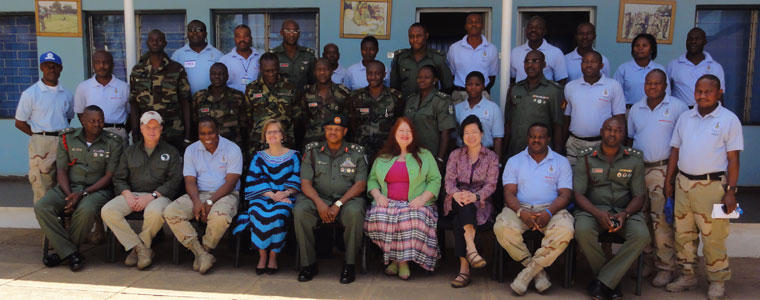United States Institute of Peace trainers in March completed a five-day exercise in Nigeria for Nigerian Army peacekeepers who are preparing to deploy across the continent for a host of missions.

United States Institute of Peace trainers in March completed a five-day exercise in Nigeria for Nigerian Army peacekeepers who are preparing to deploy across the continent for a host of missions.
The course is part of the State Department’s African Contingency Operations Training and Assistance program, or ACOTA, that USIP has worked with for the last few years. The ACOTA program teaches conflict mediation and negotiation techniques to African security personnel who will perform peacekeeping missions and so-called peace enforcement for missions across Africa. This was USIP’s first such program in Nigeria, though USIP has conducted ACOTA trainings in other African nations.
USIP experts held the workshop for nearly 30 officers and enlisted soldiers of the Nigerian army at its Peacekeeping Center, part of the Jaji Military Training Center north of Kaduna. It was an appropriate spot for USIP training – the Center was established more than five years ago as a wing of the army’s Infantry Corps Center and School to train troops for “peace support operations.” Nigeria is known for having the most experienced cadres of peacekeepers: it is one of the largest nations in Africa that contributes troops to peacekeeping operations, and in the 1960s contributed forces to the first United Nations peacekeeping mission in the Congo.
“What is really unique about this training is, first of all, they are so enthusiastic,” says Mary Hope Schwoebel, a senior program officer for USIP’s Academy for International Conflict Management and Peacebuilding who helped conduct the training.
The workshop, held March 7-11, focused on developing negotiation techniques and was designed for students to practice mediation and communication skills, according to its three organizers, USIP’s Jacqueline Wilson, Debra Liang-Fenton and Schwoebel. The program also aimed to provide an overview of basic concepts when it comes to protecting civilians, using role-play at a mock checkpoint, for example, or discussing ways to mitigate the chances that disagreements can turn violent. One of the most popular aspects of the training was the part in which USIP instructors taught the soldiers how better to listen, and then use mediation and negotiation skills to resolve issues – essential tools for managing conflict.
USIP has worked in partnership with the State Department’s ACOTA programs since 2008 and has run more than 20 training workshops in six African countries over the last three years.
“USIP has gained a partner that really dovetails with its mission to make a contribution to the management and resolution of international conflicts in African conflict areas,” says Ted Feifer, dean of students and acting dean of institutional outreach for USIP’s Academy of International Conflict Management and Peacebuilding. Feifer recently returned from another ACOTA training session in Rwanda.
Key to the program, say organizers, was incorporating lessons learned from those who have managed conflict or conducted peacekeeping operations, and then applying those lessons to the situations the Nigerian Army faces when it deploys.
Participants were gratified to be part of specific training on how to prevent conflicts, large and small. The role-play exercises were particularly helpful as part of a practical course on how to avoid conflict. “Very good job,” wrote one. “I learned a lot, especially the active listen and skills and conflict analysis.”
The workshop included 27 members of the Nigerian Army, including Brig. Gen. Paul Boroh, the commandant of the Peacekeeping Center, as well as other high-ranking officers, mid-grade officers and enlisted soldiers. Four of the participants were women. Approximately 75 percent of the group had had peacekeeping experience.
Such training also produces new trainers who can in turn teach new students in conflict management. ACOTA training is, as USIP’s Mike Lekson says, a real “peace multiplier.”
Such math is particularly valuable in Nigeria. The U.S. government considers the country to be one of the most active African nations focused on peace and reconciliation across the continent.
“Over the past decade, Nigeria has played a pivotal role in the support of peace in Africa,” providing the bulk of troops to the United Nations peacekeeping mission in Sierra Leone and the mission in Liberia according to the U.S. State Department. Nigeria has also sent many troops to the African Union-United Nations mission in Sudan. All the more reason why this type of peacekeeping training is considered relevant – and in demand.
“The initiative is very good, rewarding and productive,” another participant told organizers. “Capacity building is enhanced; this collaboration should continue.”
Indeed it will. USIP expects to return to Nigeria in September.